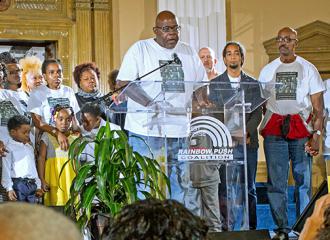The fight for Dyett will go on

Coalition to Revitalize Dyett spokesperson Jitu Brown speaks at Operation PUSH (Bob Simpson)
After 34 days, a group of parents, teachers and community activists who had been on hunger strike to demand the establishment of a new neighborhood school in a former Chicago high school closed down by the city announced an end to their strike at an event at Operation PUSH on September 19. Below is the speech of hunger strike leader Jitu Brown explaining the activists' decision and what's ahead--his remarks are preceded by a news introduction by Chicago activist and journalist Bob Simpson.
"And this hunger strike has taught people that we don't have to fight by other peoples' rules. And we can make the decision...if you could please repeat after me...make the decision...that you will not bow down to people that don't love your children."
-- Jitu Brown speaking at Rainbow PUSH
IT WAS an emotional moment for the Dyett hunger strikers at the weekly Rainbow PUSH Coalition livestream TV broadcast on Saturday, September 19. Joined by Rainbow PUSH leaders and other hunger strikers, Jitu Brown made the announcement that the hunger strike was coming to an end after 34 days. Brown pledged, however, that the struggle to create the Walter Dyett Global Leadership and Green Technology High School would go on.
The Chicago Board of Education was forced by the pressure of the hunger strike to reopen the now-closed Dyett high school, located in the historic African American neighborhood of Bronzeville. But instead of accepting the proposal that the Coalition to Revitalize Dyett had submitted for a global leadership-green technology school, Chicago Public Schools (CPS) insisted it would reopen Dyett as an arts-focused school, with a technology component.
Although the decision was called a "compromise," the Coalition to Revitalize Dyett was excluded by CPS. Flanked by politicians loyal to Mayor Rahm Emanuel, CPS chief Forest Claypool announced the hastily cobbled together "plan" 15 minutes after informing Coalition spokesperson Jitu Brown that there would be no further negotiations. Coalition members were excluded from the September 3 press conference. So the hunger strike continued.
On the September 9 Chicago Tonight show with Carol Marin, Brown explained why green technology was such an important part of the Coalition proposal for a community-based neighborhood school:
Why did we settle on Dyett Global Leadership and Green Technology High School? Number one, Dyett sits in the heart of Washington Park. There's a wildlife observatory there, there's a fully functional pond where people go fishing, there's a thriving youth-run farm and, most importantly, green technology is the number one growth industry in the U.S. So when the mayor imposed an arts school on the community, it was insulting, and that's why we didn't stop. Because what's the number one industry for unemployment? The arts. We are not opposed to a strong arts program in our school, but we just want to see a school that prepares our young people to be the next scientists, the next civic leaders and the next doctors.
At the core of the Coalition's green technology plan is organic urban agriculture. A 2013 United Nation report stated that small-scale organic farms are the best way to ensure that humanity has an adequate food supply while also improving the quality of the planetary biosphere. Dyett students could even participate in researching this through their own urban farming projects, especially when coupled with the global leadership component.
In addition to its global leadership green-technology focus, the rest of the Coalition's proposal envisions a rich, full curriculum, with democratic school governance and deep-The fight for Dyett will go on | SocialistWorker.org:
